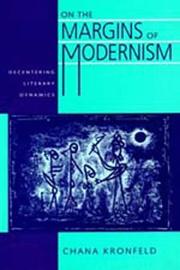| Listing 1 - 1 of 1 |
Sort by
|

ISBN: 0520083466 0520083474 0585263981 0520914139 9780520914131 9780585263984 9780520083462 9780520083479 Year: 1996 Publisher: Berkeley University of California Press
Abstract | Keywords | Export | Availability | Bookmark
 Loading...
Loading...Choose an application
- Reference Manager
- EndNote
- RefWorks (Direct export to RefWorks)
Modernism valorizes the marginal, the exile, the "other"--yet we tend to use writing from the most commonly read European languages (English, French, German) as examples of this marginality. Chana Kronfeld counters these dominant models of marginality by looking instead at modernist poetry written in two decentered languages, Hebrew and Yiddish. What results is a bold new model of literary dynamics, one less tied to canonical norms, less limited geographically, and less in danger of universalizing the experience of minority writers. Kronfeld examines the interpenetrations of modernist groupings through examples of Hebrew and Yiddish poetry in Europe, the U.S., and Israel. Her discussions of Amichai, Fogel, Raab, Halpern, Markish, Hofshteyn, and Sutskever will be welcomed by students of modernism in general and Hebrew and Yiddish literatures in particular.
Hebrew poetry, Modern --- Yiddish poetry --- Marginality, Social, in literature --- Languages & Literatures --- Middle Eastern Languages & Literatures --- History and criticism --- Marginality, Social, in literature. --- History and criticism. --- Yiddish literature --- allusion. --- contraversions critical studies in jewish literature culture and society. --- david fogel. --- deleuze. --- diaspora. --- diversity. --- guattari. --- hebrew culture. --- hebrew literary history. --- historical studies. --- hofshteyn. --- imagist. --- jews. --- judaism. --- literary criticism. --- literary historiography. --- literary trend. --- markish. --- modern jewish literature. --- modernism. --- modernist hebrew poetry. --- modernity. --- moyshe leyb halpern. --- poems. --- poetry. --- religion. --- religious literature. --- stylistic. --- yehuda amichai. --- yiddish literary history.
| Listing 1 - 1 of 1 |
Sort by
|

 Search
Search Feedback
Feedback About UniCat
About UniCat  Help
Help News
News